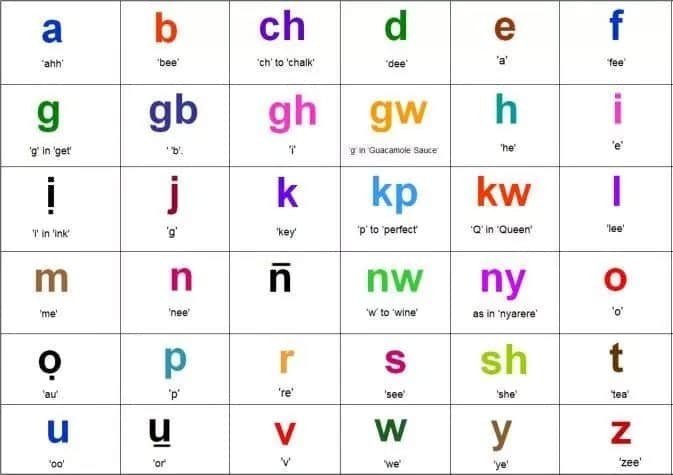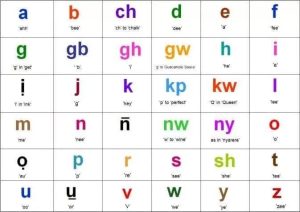Exploring The Intricacies Of The Igbo Alphabet

The Igbo alphabet is a fascinating system of writing, with a rich history and unique characters. Developed to represent the sounds of the Igbo language, each letter holds its own significance and meaning. Igbo alphabet is not just a tool for communication but also a symbol of cultural identity and heritage. Dive into the world of Igbo symbols and explore the beauty and complexity of this ancient writing system. Discover the stories and traditions behind each character, and unravel the mysteries of the Igbo alphabet.
The Fascinating World of the Igbo Alphabet
Welcome to the captivating realm of the Igbo alphabet! Have you ever wondered about the unique characters that make up the written language of the Igbo people? In this article, we will take a deep dive into the history, structure, and importance of the Igbo alphabet. Join me on this exciting journey as we unravel the mysteries of one of Africa’s most intriguing writing systems.
The Origins of the Igbo Alphabet
The Igbo alphabet, also known as the Nsibidi script, has a rich history that dates back centuries. Nsibidi is a system of symbols that was traditionally used by the Igbo people of Nigeria for communication and recording information. These symbols were often carved or drawn on various objects such as walls, pottery, and cloth.
Legend has it that the Nsibidi script was given to the Igbo people by a deity known as Nze na Ozo. Over time, the symbols evolved into a more structured alphabet that is still in use today. The Igbo alphabet consists of 36 letters, each with its own unique sound and meaning.
The Structure of the Igbo Alphabet
The Igbo alphabet is a beautiful and intricate system of writing that is both fascinating and complex. The alphabet consists of both consonants and vowels, each represented by a unique symbol. Unlike the English alphabet, which has 26 letters, the Igbo alphabet has 36 letters, making it a bit more challenging to master.
Consonants
Consonants are the building blocks of the Igbo alphabet. There are 22 consonants in the Igbo alphabet, each with its own distinct sound. Some of the consonants in the Igbo alphabet include:
- N – pronounced like the ‘n’ in “nice”
- K – pronounced like the ‘k’ in “kite”
- Ụ – pronounced like the ‘oo’ in “book”
- Ch – pronounced like the ‘ch’ in “cheese”
Vowels
Vowels are essential components of the Igbo alphabet as they help form words and convey meaning. There are 14 vowels in the Igbo alphabet, each representing a specific sound. Some of the vowels in the Igbo alphabet include:
- A – pronounced like the ‘a’ in “cat”
- E – pronounced like the ‘e’ in “elephant”
- I – pronounced like the ‘i’ in “igloo”
- Ọ – pronounced like the ‘aw’ in “saw”
The Importance of the Igbo Alphabet
The Igbo alphabet plays a crucial role in preserving the cultural heritage and identity of the Igbo people. By learning and using the Igbo alphabet, individuals can connect with their roots and ensure that this beautiful writing system is passed down to future generations.
Additionally, the Igbo alphabet is used in educational settings to teach children how to read and write in their native language. By incorporating the Igbo alphabet into the curriculum, schools can help students develop a strong sense of pride and confidence in their cultural identity.
Learning the Igbo Alphabet
Are you ready to embark on the exciting journey of learning the Igbo alphabet? Here are a few tips to help you get started:
- Start with the basics: Begin by familiarizing yourself with the individual letters of the Igbo alphabet and practicing their sounds.
- Practice regularly: Consistent practice is key to mastering the Igbo alphabet. Try writing simple words and sentences using the alphabet to improve your skills.
- Seek help: Don’t hesitate to ask for assistance from native Igbo speakers or language teachers if you need help with pronunciation or comprehension.
- Immerse yourself: Immerse yourself in Igbo culture by listening to Igbo music, watching Igbo movies, and engaging with Igbo speakers to enhance your learning experience.
The Igbo alphabet is a fascinating and intricate writing system that holds immense cultural significance for the Igbo people. By exploring the origins, structure, and importance of the Igbo alphabet, we gain a deeper appreciation for the richness and diversity of African languages and cultures.
So, whether you’re a language enthusiast, a curious learner, or simply someone interested in the beauty of written communication, the Igbo alphabet is sure to captivate and inspire you on your journey of discovery.
Igbo Alphabet Song OR Egwu A B Ch (Igbo letters of the alphabet) – A b ch d Igbo OR abidii Igbo
Frequently Asked Questions
What are the letters in the Igbo alphabet?
The Igbo alphabet consists of 36 letters, including 8 vowels and 28 consonants. Each letter represents a specific sound in the Igbo language.
How is the Igbo alphabet different from the English alphabet?
The Igbo alphabet has some unique letters that are not present in the English alphabet, such as Ọ, Ụ, and Ȯ. Additionally, the pronunciation of certain letters in Igbo may differ from their English counterparts.
Are there any diacritics used in the Igbo alphabet?
Yes, the Igbo alphabet uses diacritics, such as accents and dots, to denote certain sounds. These diacritics are important for accurately representing the pronunciation of words in Igbo.
Final Thoughts
In conclusion, the Igbo alphabet is a vital aspect of Igbo culture and heritage. Learning the Igbo alphabet can help preserve the language and promote cultural understanding. It serves as a bridge connecting generations and preserving traditions. Embracing and teaching the Igbo alphabet is crucial for the continued appreciation and celebration of Igbo language and identity.





